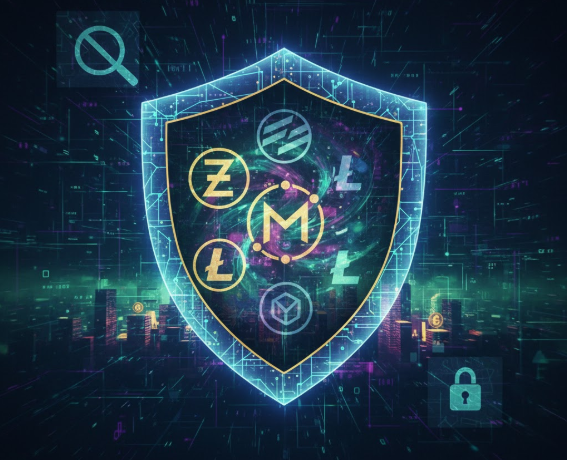Cryptocurrency Prices by Coinlib

High Privateness Cash by Market Cap in 2025 – ELLIPAL
Privateness cash have gotten an important a part of the crypto market, providing customers true confidentiality in digital transactions. As regulatory scrutiny grows and blockchain forensics advance, property like ZCash (ZEC) and Monero (XMR) are gaining momentum by utilizing superior cryptographic instruments resembling zero-knowledge proofs, ring signatures, and stealth addresses to maintain transaction particulars personal and untraceable. Pushed by rising demand for monetary privateness, international crackdowns, halving-related provide shocks, and institutional curiosity, privateness cash are rising as a key sector within the evolving crypto ecosystem.
What Are Privateness Cash?
Privateness cash are a category of cryptocurrencies that energy personal and nameless blockchain transactions by obscuring their origin and vacation spot. Among the methods utilized in these nameless cryptocurrencies embrace hiding a person’s actual pockets stability and deal with, and mixing a number of transactions with one another to elude chain evaluation.
Within the spirit of transparency, Bitcoin and different non-privacy blockchains enable anybody to view public addresses and transactions of their community, which makes it comparatively easy to trace somebody's deposits and withdrawals.
Nonetheless, privateness cash deal with two totally different elements: anonymity and untraceability. Anonymity hides the identification behind a transaction, whereas untraceability makes it just about inconceivable for third-parties to comply with the path of transactions utilizing providers resembling blockchain evaluation.
High Privateness Cash by Market Cap
ZCash (ZEC)
ZCash is a privacy-focused cryptocurrency launched in 2016 as a fork of Bitcoin. It was created by a crew of scientists and cryptography consultants to enhance transaction anonymity and safety. Initially referred to as Zerocoin after which Zerocash, it was later rebranded as ZCash by the Electrical Coin Firm.
ZCash makes use of the zk-SNARK protocol to encrypt transactions, hiding the sender, recipient, and quantity. Customers also can go for clear transactions, much like Bitcoin.
In contrast to Bitcoin’s SHA-256, ZCash makes use of Equihash for mining, which now requires ASIC miners or mining swimming pools for effectivity. It operates on a proof-of-work system and stays a preferred alternative for these in search of privateness in cryptocurrency.
Regardless of regulatory scrutiny because of its privateness options, ZCash continues to be actively traded and developed below the Zcash Basis.
Monero (XMR)
Monero is a privacy-focused cryptocurrency that prioritizes anonymity and untraceability. In contrast to Bitcoin, the place transactions might be traced, Monero ensures that every transaction can't be linked to a particular person. Its fungibility means each Monero coin is an identical and interchangeable, making it inconceivable to tell apart one coin from one other.
Monero achieves privateness by stealth addresses and ring signatures. Stealth addresses generate a novel deal with for each transaction, whereas ring signatures combine a number of transactions to obscure the sender. Every person has a non-public view key to confirm incoming transactions and a non-public spend key to authorize funds.
Monero operates on a proof-of-work (PoW) community utilizing the RandomX algorithm, which is proof against ASIC mining. This retains mining accessible to unusual GPU and CPU customers, supporting community decentralization.
Its essential use case is personal transactions, providing safety for customers who need to defend their monetary exercise from public or regulatory scrutiny.
Litecoin (LTC)
Litecoin, also known as the “silver to Bitcoin’s gold,” is a peer-to-peer cryptocurrency created by Charlie Lee in 2011. It shares many options with Bitcoin however has a number of key variations that make it quicker and extra cost-efficient for on a regular basis transactions.
Litecoin's main distinction is its use of the scrypt hashing algorithm, which makes it extra proof against specialised mining {hardware} (ASICs), permitting common customers with GPUs or CPUs to mine. Moreover, Litecoin presents quicker block technology occasions (each 2.5 minutes in comparison with Bitcoin’s 10 minutes), leading to faster transaction confirmations and decrease transaction charges.
In 2022, Litecoin launched the Mimblewimble Extension Blocks (MWEB) improve, including optionally available privateness options for transactions, enhancing its attraction for customers in search of extra discretion.
Litecoin stays a preferred alternative for these searching for a decentralized digital foreign money with quicker transaction occasions and decrease charges than Bitcoin, whereas nonetheless sustaining a robust group and liquidity within the crypto house.
Sprint (DASH)
Sprint is a cryptocurrency launched in 2014 with a concentrate on privateness and quick transactions. Initially referred to as Xcoin after which Darkcoin, it was rebranded as Sprint in 2015. Its purpose is to function a digital money various, usable for on a regular basis funds through wallets, bank cards, or platforms like PayPal.
Sprint presents optionally available privateness by its CoinJoin service, which mixes transactions to make them tougher to hint. This ensures enhanced anonymity for customers who select it, whereas nonetheless permitting commonplace transactions for on a regular basis use.
The community is supported by masternodes, particular nodes requiring a stake of 1,000 DASH, which assist validate transactions, handle governance, and allow superior options like CoinJoin.
Whereas Sprint goals to facilitate reliable every day transactions, its privateness options have drawn regulatory scrutiny, and a few areas, just like the EU, prohibit privacy-enhancing providers. Regardless of this, Sprint continues to advertise quick, versatile, and optionally personal transactions for its customers worldwide.
Decred (DCR)
Decred is a hybrid cryptocurrency launched in 2016 that mixes Proof-of-Work (PoW) and Proof-of-Stake (PoS) to make sure safe, decentralized governance. Impressed by Bitcoin, it was created to empower customers to actively take part in community selections whereas nonetheless functioning as a digital foreign money.
Miners validate transactions utilizing PoW, whereas stakers maintain DCR to substantiate blocks and vote on community upgrades. This governance course of is managed by Politeia, a proposal system the place stakeholders can submit, focus on, and vote on protocol adjustments.
Decred’s block time is 5 minutes, and block rewards are cut up amongst miners (60%), stakers (30%), and a treasury (10%). Its most provide is capped at 21 million DCR.
DCR is valued not solely as a foreign money but in addition as a instrument for taking part in governance and funding community enhancements, making it a novel possibility for these in search of each funding potential and affect over a blockchain mission.
The Core Drivers Behind the Surge in Privateness Cash
Regulatory Crackdowns and Actual-World Circumstances Amplify Demand
As cryptocurrency faces tighter regulation, the demand for privacy-enhancing options has change into more and more pressing. Blockchain forensics consultants now use machine studying to trace wallets, construct person profiles, and hint asset flows, prompting international regulators to reply with stricter insurance policies. The U.S. Treasury is exploring blockchain monitoring by the proposed GENIUS Act, whereas the EU plans to implement stricter due diligence for self-custody pockets transactions by late 2024. Issues over privateness have been amplified in October 2025 when the U.S. Division of Justice seized 127,000 Bitcoins from the Cambodian Prince Group, an occasion that uncovered the traceability of conventional cryptocurrencies and fueled rising curiosity in privateness cash providing superior anonymization applied sciences.
Halving Expectations Gasoline Provide-Shrinkage Hypothesis
Privateness cash like Zcash (ZEC) are additionally seeing elevated curiosity because of upcoming halving occasions. Zcash will expertise a halving in November 2025, lowering the block reward from 3.125 ZEC to 1.5625 ZEC, with the every day provide anticipated to drop by roughly 1,500 ZEC. This modification will drive Zcash’s implied inflation price from double digits right down to single digits, inflicting a shift in supply-demand dynamics. Speculators are positioning themselves forward of this occasion, additional sparking curiosity within the coin as a long-term funding.
Institutional Adoption and Trade Confidence
As privateness cash achieve recognition, institutional help and trade confidence have bolstered their development. Grayscale elevated its Zcash holdings from 320,000 ZEC to 380,000 ZEC between January and August 2025 and launched the Zcash Belief Fund in October, signaling robust institutional curiosity. Moreover, a16z (Andreessen Horowitz) highlighted privateness as a essential enabler for the large-scale adoption of cryptocurrencies. The Ethereum Basis’s formation of a privateness crew and Paxos’ partnership with Aleo to launch a compliant privateness stablecoin (USAD) are additional affirmations of the sector’s evolution.
Market information additionally underscores the rising demand for privacy-focused options. In 2025, Google searches associated to crypto privateness spiked considerably. Zcash’s shielded fund pool reached practically 4 million ZEC, and Railgun’s month-to-month buying and selling quantity exceeded $200 million. Moreover, the International Property Management Workplace lifted sanctions on Twister Money, additional amplifying the momentum within the privateness house.
Thought Leaders and Institutional Resonance
Influential figures within the tech world, significantly in Silicon Valley, have additionally contributed to the surge in privateness cash. Some have referred to Zcash as “insurance coverage in opposition to Bitcoin”, emphasizing its privateness options as a hedge in opposition to the surveillance dangers posed by central financial institution digital currencies (CBDCs). This narrative has resonated with institutional capital, aligning privateness cash as a priceless countermeasure to rising authorities oversight.
These mixed components, regulatory shifts, halving occasions, institutional backing, and rising market validation, are propelling privateness cash into the highlight, solidifying their place in the way forward for cryptocurrency.
Conclusion
Privateness cash are rising as a key response to rising monetary surveillance. With regulatory crackdowns, upcoming halvings, and rising institutional curiosity, property like Monero and ZCash are gaining renewed momentum. Their concentrate on safe, nameless transactions underscores the rising significance of privateness within the subsequent section of blockchain evolution.
The content material of this weblog is for informational functions solely and doesn't represent funding recommendation. Cryptocurrencies are risky and include vital dangers. All the time conduct your individual analysis and seek the advice of with a monetary advisor earlier than making any funding selections.
